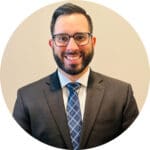MILO Cognitive Advisory Board
The MILO product line and organization has achieved great success in the military and law enforcement industries. That success is largely due to the depth of experience of our internal resources—the majority of those coming from the communities we serve. Our employees typically remain with MILO for decades, but the downside of that longevity is a potential disadvantage of staying ahead of industry needs because those employees are no longer embedded within their industries as end-users. While it has not affected us yet, we have recognized that our increasingly low turnover—something we definitely consider a positive in organizational continuity—does present a potential for future gaps in our expertise as time progresses and industries evolve.
To ensure that we remain connected to relevant points in those sectors we serve—before those gaps appear—we have assembled a limited but comprehensive board of highly competent and trusted advisors to ensure we have current information from significant sectors when considering new content, curriculum, partnerships, or other product offerings.
The MILO Management team considers these advisors highly regarded members of an elite group with a diverse range of experience and expertise. As such, we are proud to call them “Friends of MILO.”

Chair of the Board – Dr. Joy VerPlanck
Dr. VerPlanck is a senior leader in the field of learning and development with over 25 years of experience in adult education and high-stakes training. She is a former US Army Military Police Officer and the owner of a service-disabled veteran-owned small business (SDVOSB), providing expertise in identifying and overcoming barriers in curriculum design to make training successful. She is a thought leader for MILO’s Cognitive Division – guiding and synthesizing applicable academic research and facilitating strategic partnerships. With a Master of Science in Organizational Leadership and Instructional Design, and a Doctorate of Educational Technology, her research path has included the effects of training with immersive technology on creative thinking and cognitive load, and instructional design to create empowered and independent thinkers in rigid operational environments.
Strategic Advisors
Dr. Ryan Curl
Dr. Ryan Curl is the AI Governance Lead at Upstate Medical University Hospital, where he ensures that AI policies and implementations support innovation while maintaining ethical and regulatory integrity across healthcare, research, and academic domains. With a strong foundation in neuroscience (M.S.) and cognitive psychology (Ph.D.), he brings a unique blend of behavioral science, data expertise, and business consulting experience to AI governance. Dr. Curl has worked extensively on AI implementation strategies, guiding organizations in leveraging advanced technologies effectively. His expertise positions him as a key advisor in balancing innovation with responsible AI oversight, ensuring solutions are both cutting-edge and scientifically grounded.

Mr. Kevin Fischer
Kevin Fischer is the Executive Director of NAMI Michigan. NAMI, the National Alliance on Mental Illness, is the nation’s largest grassroots mental health organization dedicated to building better lives for the millions of Americans affected by mental illness. A retired businessman, Kevin joined NAMI as a volunteer in 2011 after his oldest son Dominique was diagnosed with a mental illness in late 2007 and was lost to suicide in 2010. After serving on the NAMI Michigan Board of Directors as the NAMIWalks Chairperson for two years, and as Board Vice-President for two years, Kevin accepted the role of Executive Director in 2014.
A mental health and suicide prevention advocate, Kevin is the founder and Director of The Dominique Fischer Memorial Foundation and serves on the Board of Directors of several behavioral health organizations throughout Michigan, including Governor Whitmer’s Suicide Prevention Commission, the Michigan Department of Health & Human Services (MDHHS) Mental Health Diversion Council and Behavioral Health Advisory Council (BHAC), Disability Rights Michigan’s (DRM) Protection & Advocacy for Individuals with Mental Illness (PAIMI) Advisory Board, and is a member of the Crisis Intervention Team (CIT) International Board of Directors. Quoted as saying, “This is his last job; his last fight,” Kevin is dedicated to eliminating the stigma of mental illness, which he considers the leading barrier to early diagnoses and treatment, which leads to better outcomes for all.

Dr. Eugenia Guilmartin, COL (Ret)
Dr. Guilmartin is a retired US Army Military Police Colonel, executive leader, security professional, and political scientist with 30 years of experience applying evidence-based solutions to the most strategically sensitive problems in the people domain. A leader-scholar who blends interdisciplinary study with operational expertise, she has led organizations of over 4000 employees operating across the globe as well as taught military and civilian graduate-level students in strategy, policy, and operations. She applies her unique understanding of political psychology and how micro-level individual behavior can influence macro-trends at regional and higher levels. She holds a BS from the United States Military Academy, a master’s degree from the Naval War College, a Ph.D. in political science from Stanford University, and has served as an adjunct associate professor of security, strategy, and security operations at Georgetown University. Dr. Guilmartin has recently served at the Pentagon and as the assistant commandant of the U.S. Army Military Police School at Fort Leonard Wood, Missouri, and has served in Germany, the Balkans, Korea, Iraq, and Afghanistan conducting police mentorship, corrections mentorship, detainee operations, and security and mobility support operations. She is a member of the International Association of Chiefs of Police and the Midwest Political Science Association.

Dr. Lois James
Dr. James is the Assistant Dean of Research at the Washington State University (WSU) College of Nursing. She focuses on bias, stress, sleep, and performance in “high-stress” populations such as police officers, military personnel, nurses, and top-tier athletes. Dr. James is the founding director of Counter Bias Training Simulation (CBTsim). Her work has been published extensively in academic journals, practitioner magazines, and mainstream media such as the New York Times and the Washington Post. Her expertise in bias and performance informs research, articles, presentations, and curriculum.

Ms. Nadine Jones
Ms. Jones is General Counsel & Corporate Secretary, reporting directly to the CEO of a multibillion company. She is an author and seasoned executive who brings a wealth of diverse, legal, commercial, and compliance corporate experience. With vast experience in developing and maintaining a corporate compliance program, Ms. Jones’ has also served as an Adjunct Antitrust Professor at Fordham Law School.
As a graduate of Howard University School of Law, Ms. Jones has a strong sense of social justice and equity. In June 2020, she co-founded an organization called The Initiative: Advancing the Blue & Black Partnership (“The Initiative”) along with two other Howard Law alumni. The Initiative was established to end systemic police violence and implement a collaborative approach to building healthy, scalable, community policing models. As executive director, Nadine developed and executed strategies, plans, and policies by partnering with members from both the Blue and Black communities, and by leveraging the networks of board members, advisors, and staff to implement and further community policing measures. Ms. Jones served as the chief spokesperson and a visible public advocate, championing the organization’s mission externally to partners and stakeholders, including working closely with police chiefs under consent decree. She also worked closely with data analytics specialists to develop the only community policing scorecard in the United States, and worked with a leading e-learning corporate ethics and compliance developer to develop e-learning training modules for police officers.”

Dr. Will Kalkhoff
Dr. Kalkhoff is a Professor of Sociology at Kent State University. He is the Executive Director of the Electrophysiological Neuroscience Laboratory of Kent (ENLoK) as well as the Graduate Coordinator for the online M.A. program in Criminology and Criminal Justice. He is also a fellow member of the Inter-University Seminar on Armed Forces in Society. Dr. Kalkhoff’s current research efforts focus on team perception and performance under threat in virtual environments and on the effects of media use on brain function, personality, and social interaction. His research has been generously funded by the National Science Foundation and the Army Research Office. Outside of academia, Dr. Kalkhoff serves as a Patrol Officer in the Reserve Unit for the Stow Police Department in Stow, Ohio. He also currently serves as a Safety Ambassador for the City of Kent in Ohio.

Mr. Daniel Salazar
Daniel Salazar is a community corrections professional, certified by the Florida Department of Law Enforcement as a general, firearms, and defensive tactics instructor. Since 2022 he has served as the primary MILO instructor in Florida’s fourteenth judicial circuit for community corrections. In 2024 he was the recipient of a Chris Connel Young Professional Award presented by Tallahassee Community College Florida Public Safety Institute. He holds a Master of Science in law enforcement intelligence and is pursuing a doctorate in learning design and performance technology. His goal is to promote research-based training practices in the public safety sector.

Mr. Richard G. Schott
Richard is an Independent Police Auditor in Fairfax County, VA, serving over 27 years in the F.B.I. Case agent in the Birmingham, Alabama division from 1989-1998, working, among other violations, Civil Rights investigations; Associate Division Counsel for the Atlanta division from 1998-2000; Office of the General Counsel (OGC) of the FBI from 2000-2017. As a member of OGC’s Legal Instruction Unit, Richard spent 17 years training and instructing at the FBI Academy in Quantico, VA. The primary audiences were FBI new agent trainees and attendees of the FBI’s National Academy program. His expertise in use of force/deadly force issues and the DOJ/FBI Deadly Force policy helps inform content and curriculum on case law and use of force.
Mr. Joe Smarro
Mr. Joe Smarro is a decorated combat veteran of the United States Marine Corps, Mr. Smarro served in Operation Enduring Freedom and Operation Iraqi Freedom before joining the San Antonio Police Department in 2005. As a founding member of SAPD’s Mental Health Unit, he helped shape it into a nationally recognized model. His work has been featured in various media outlets, including the Emmy award-winning documentary Ernie & Joe: Crisis Cops. In 2017, he founded SolutionPoint+, a national training and consulting firm focused on mental wellness and public safety. A TEDx speaker and Amazon best-selling author of Unarmed: De-escalation Techniques to Cultivate Courage, Compassion, and Connection, Mr. Smarro is committed to transforming behavioral health and criminal justice systems nationwide.

Ms. Megan Torrance
Ms. Torrance is the CEO & founder of TorranceLearning, a company dedicated to innovative learning strategy, design, deployment & data. Under her leadership, the firm has flourished, serving Fortune 1000 companies with a global footprint. Ms. Torrance’s strategic vision has enabled TorranceLearning to impact millions of employees worldwide, reflecting her deep commitment to transformative corporate education.
Her influence extends industry-wide. As an author of go-to books like “Agile for Instructional Designers,” “Data & Analytics for Instructional Designers,” and “Making Sense of xAPI,” she has shaped the discourse in the field. She is a Facilitator with eCornell’s Women’s Executive Leadership certificate, an Instructor in Cornell’s Executive HR Master’s program, and an adjunct in Penn State’s Learning Design & Technology Master’s program.

Mr. Brian Uridge
Brian Uridge has more than three decades of experience in law enforcement, healthcare security, and fire service.
He is the Senior Director of Michigan Medicine Safety and Security at the University of Michigan. In this capacity, Brian Uridge oversees security and law enforcement personnel for a health system with 34,000 employees. that is visited by three million patients per year. A certified police officer for the university, he manages a full-time team, including clinical trainers, a K-9 team, security staff, and a community policing unit.
During his first few years with the University of Michigan, Mr. Uridge helped create the health system’s first K-9 program and developed a home health tactical safety training procedure. Before that, he spent three years as director of security services for Spectrum Health System in Grand Rapids.
Brian Uridge holds a bachelor of science in criminal justice from Ferris State University and a master’s degree in public administration from Western Michigan University. He also studied advanced criminal justice at the Federal Bureau of Investigation National Academy, which selects less than two percent of law enforcement officers nationwide.
![]()
To learn about the valuable contributions and expertise of the individuals who formerly comprised the Advisory Board, please visit our Former Advisors Page.


